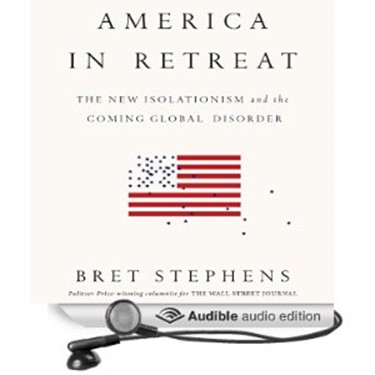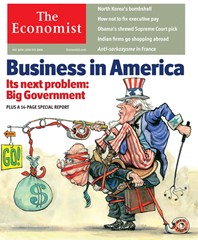 If anything, the GOP debate shows that most of us – especially those who want to be President — are either out of touch or missing a lot of information in regards to foreign policy.
If anything, the GOP debate shows that most of us – especially those who want to be President — are either out of touch or missing a lot of information in regards to foreign policy.
So, let me offer some informed not inflamed tips.
The first tip would be to read these two fairly recent books that examine foreign policy in different ways – sometimes conflicting ways – about the future of the world and our place in it.
- The first is America in Retreat by Bret Stephens. Here is my review. Stephens writes for the Wall Street Journal’s editorial page. He is a hawk, but he makes some great points about world problems when the US becomes isolationist.
- The second is Peter Zeihan’s Accidental Superpower. Here is my review of that one. Zeihan sees a near future with low growth for the United States, but far better than the rest of the world. He bases a lot of his theories on the continued production of shale oil which is changing the economic dynamic especially for countries like Saudi Arabia, Iran, Russia, and Venezuela. He also believes we in the US will become exactly what Stephens warns us about — being more insular and keeping to ourselves — because, with our new found energy independence, we can and we’re tired of the rest of the world’s problems draining us. Zeihan considers himself a libertarian.
Again, get both books on Audible.com and listen while you drive or workout. I increase the narrator’s speed and knock off a book in about 3 workout sessions.
 The second tip: subscribe to these two news services which analyze foreign affairs while also giving you morning emails that are fairly quick reads with the option of reading more in depth articles. Both are subscription services. But I think they are worth it for getting better information and especially if you travel a lot.
The second tip: subscribe to these two news services which analyze foreign affairs while also giving you morning emails that are fairly quick reads with the option of reading more in depth articles. Both are subscription services. But I think they are worth it for getting better information and especially if you travel a lot.
- Stratfor looks at foreign policy from a straight forward geopolitical viewpoint. You’re dictated by your geography.
- The second is The Economist. I think this is the best weekly magazine on the planet. It is especially helpful to Americans because it offers a business a business perspective from Europe that is both left and right – and something to compare and contrast with our media coverage.
If you have others, please pass them on either here or on my social media pages.
Remember, these sources will give you a wider understanding of the foreign policy situation and the messes we’re involved in or we’re ignoring. We’re looking for a state of awareness and not spouting our beliefs based on scant bits of information.
I find myself listening to people – especially experts on foreign policy – more than offering my opinions because foreign policy is so hard to understand – and there is so much information out there that is always changing.
One of the biggest revelations to me traveling around the world was the different media perceptions of the US and what we do as a superpower. It is more amazing when you watch CNN International in a foreign country; let’s just say, it is not the CNN we get on our local cable.
 And that is to be expected. News outlets in different countries, like people in different countries, have different biases.
And that is to be expected. News outlets in different countries, like people in different countries, have different biases.
We have a hard enough time trying to figure out what all Americans are thinking on issues, but to keep abreast of the feelings and needs of the rest of the world … good luck.
I try to keep these things in mind while I look at stories on foreign affairs that involve us as a country and a people.
- We are blessed with an incredible geography loaded with natural resources and two barriers known as oceans. We hit the geography lottery, folks. So, we, as a country, are wealthy beyond the dreams of any other country on earth. My brother-in-law John Williams, who lives in Japan, told me that foreigners walking into our supermarkets would be overwhelmed with the amount of food and products we have.
- As a result, some countries either want to be us or take us down – economically and some militarily – because we have so much.
- As a nation, we cannot make up our mind what to do with all of our assets. Do we want to be out there controlling the world and the economy or do we want to be “home bodies” when it comes to foreign policy? Right now, we are at a crossroads. We are tired of the wars in Iraq and Afghanistan. But we’re hearing people like Lindsey Graham say we need troops on the ground in Syria to fight ISIS who maybe can infiltrate us.
 Answers are tough. Still, you need to go forth and read about the world.
Answers are tough. Still, you need to go forth and read about the world.
Comments on this entry are closed.